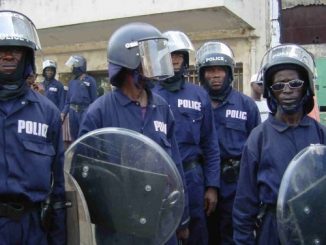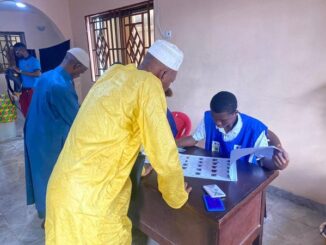By Joseph S. Sherman, Washington, DC
Thursday October 6, 2005
Liberia was long characterized by its division into two basic societies. One was composed of the settlers of the freed slaves, who immigrated to West Africa from the New World in the nineteenth century, and the Liberians, who descended from them; the other much larger faction was made up of the tribal Africans indigenous.
From Liberia’s inception there was an exclusive identification of the state with the immigrant experience with American settlers, which was emphasized in its national symbols. The young country’s motto, for example, expressed the conviction that “The Love of Liberty Brought Us Here,” and the seal of the republic featured the images of an immigrant and settler’s plow. The black settlers came to be called Americo-Liberians, while the indigenous population was referred to “Country People.” The 1980 coup d’etat led by Master Sergeant Samuel Kanyon Doe and his enlisted compatriots broke the political dominance of the Americo-Liberia elite, and subsequently paved the way for mass participation of the natives in the socioeconomic and political enhancement of Liberia. Since then, ethnic tensions, political instability, a brutal and senseless civil war which degenerated to ethnic cleansing engulfed the once peaceful nation in the West Coast of Africa.
From my view point, the problem of ethnicity in Liberia is linked with the question of competing loyalties. Since the coup d’etat of 1980 and the upsurge of the civil war in 1989, ethnic competition for the scarce economic resources and political power has taken root among ethnic groups; each group tends to fight to have a president come from their group. For them, the president will loot the state for this ethnic group. In other words, the president is not for the state, but his ethnic group. This is the root cause of ethnic groups struggle to control the state. The competition for political power has become a way of life in the Liberian society. The quest for power among politicians has engendered the sprouting of 22 political parties’ representing various ethnic groups for the October presidential elections in Liberia. Ethnic groups encourage the emergence of ethno-nationalism in order to mobilize supporters. This type of politicized ethnicity makes its appearance when nationalism extends the field of action of the ethnic community from purely cultural and social spheres to that of economic and politics. Some political leaders in Liberia are in the habit of allocating to their ethnic groups considerable state resources to extend their influence and control. Consequently, this practice encouraged corruption, rivalry, hatred, and conflict between ethnic groups.
The proliferation of ethnic factions (Krahn, Mandingo, Gio, Mano, Lorma, Sarpo, etc) during the 14-year civil war, ethnic cleansing and mass brutal murders committed by warring ethnic factions against harmless and innocent ethnic groups, are cases in point of ethnic loyalty eating the fabric of once stable Liberia. How can post-war Liberia eradicate or minimize this cancer that is consuming the unity and nationalism of Liberia? In my opinion, eradicating ethnic loyalty is illogical. Ethnic affiliation as an extended family is a great asset in nation building especially when acting as a moral retaining influence upon, and means of security for its members. Furthermore, family, clan, and ethnic group are still the essential structures of social relationship in Liberia. Nevertheless, in order to minimize internal and political conflict emanating from ethnic loyalty or alliance, leaders of post-war Liberia should formulate a new concept of the common good based on ethnic identities, political consensus, and people’s consent. To develop such a concept does not mean that ethnic differences must be denied; rather ethnic identities should be tolerated on the basis that fosters the common good. This task involves developing a more profound unity that underlines ethnic differences.
Finally, there is a need in post-war Liberia to develop educational and cultural programs at the grassroots level through which ethnic and cultural diversities can be appreciated and integrated into national unity. The Inter-faith mediation committee, civic organizations, and Non-governmental organizations can play a significant role in developing these programs. Political leaders on the other hand, should promote unity between ethnic groups, mutual tolerance and accommodation of diversity of opinion, respect to pluralism, and cherish the sense of the common good.
About the Author:
Joseph S. Sherman was an erstwhile Broadcast Journalist with ELCM Radio, now Radio Veritas, Monrovia, Liberia, and former General Editor of the Footprint Newspaper in Freetown, Sierra Leone. At present he is the Director of a Multi-Cultural Adult Education Center in Washington, DC. E-mail: jsherman68@hotmail.com




Leave a Reply